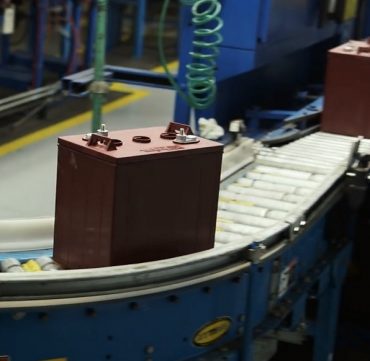
In a recent article published by The Washington Times, Roger Miksad, President of Battery Council International, explains how advocacy for a strong domestic battery industry has never been more essential to ensuring the nation’s power needs are met for another century. This article is reprinted from The Washington Times with permission, copyright 2024.

![Washington Times Logo[82] Logo for The Washington Times](https://batterycouncil.org/wp-content/uploads/2023/10/Washington-Times-Logo82.jpg)
The U.S. battery industry is vital to the national economy. Batteries play a a critical role in virtually every aspect of our society and are an essential component of cars, trucks, forklifts, data centers, emergency backup systems and more. Every facet of the government and commerce relies on them every day to keep our country running and protect economic growth.
Our domestic security relies on our ability to have a safe and reliable source for batteries. Our progress toward a more electrified future hinges completely on our nation’s competency with manufacturing, recycling, and innovating batteries.
Advocacy for a strong domestic battery industry has never been more essential to ensuring the nation’s power needs are met. For more than a century, Battery Council International (BCI), the nation’s longest-running battery industry trade association, has been such an advocate. BCI has worked tirelessly with government partners along with technological and industry leaders to continue to best position our country toward domestic battery security
BCI believes this is a critical time to ensure America is ready for an electrified future that will feature a wide variety of demands and a breadth of battery technologies. In addition to supporting diverse applications, the battery industry must also forge a resilient supply chain that isn’t overly reliant on a single product, company, or foreign adversary nation.
Batteries built with lead – a domestically abundant material – must have a key role in our strategies to protect sources of U.S. energy and economic resiliency. For more than 125 years, these batteries have provided the firm foundations built on by other energy storage technologies such as flow, sodium, lithium-ion, advanced lead, and others. All together, the downstream impact of the domestic battery manufacturing industry adds up to $8.1 trillion in total economic output and 48 million U.S. jobs.
We urge Congress to support a vibrant and diverse domestic battery industry, and we believe the future must include the innovation of lead battery technology in order to be successful. A strong domestic battery industry is critical in this age of supply chain disruptions and contentious global trade policies, and the nation should continue to invest in American stability through lead battery manufacturing.
The bipartisan investments of the past four years are showing profound impact, with more than $177 billion in private industry investments in battery and EV infrastructure projects announced in just the last two years. These investments are essential: the need for batteries will continue to grow rapidly, as cumulative energy storage capacity will increase more than tenfold by the end of 2030.
To help foster continued innovation and leadership in battery technology and production, BCI recommends two practical actions.
First, Congress Should Fully Fund and Incentivize Essential R&D
The U.S. Department of Energy must be provided the appropriations to fully fund key research programs that foster innovation through public-private partnerships.
DOE’s national labs, the Office of Electricity, and advanced science initiatives are excellent stewards of taxpayer dollars. History has shown that wise investments in basic industrial science can pay dividends long into the future. That includes looking beyond lithium-ion technology to support next generation lead batteries, as well as flow, sodium and other emerging battery chemistries. Batteries that have high rate of recyclability and support a closed loop economy should be prioritized.
The ever-growing need for energy storage requires partnerships between DOE and industry that will bridge the gap between new ideas and real-world commercialization of next-gen energy storage.
Second, Congress Should Support Domestic Battery Manufacturing Upgrades.
Congress and the White House have rightly focused on bringing new battery manufacturing and supply chain capacity to the U.S. in recent years. Now, the nation needs to invest equally in strengthening our existing domestic battery manufacturing base to bring advanced technologies and techniques to market.
For example, Congress should immediately eliminate punitive excise taxes on key battery component materials like lead oxide, antimony and sulfuric acid that put U.S. battery manufacturers at a cost disadvantage.
Additionally, lawmakers should expand incentive programs previously aimed at onshoring or reshoring and make those incentives more readily available to existing facilities. It is a wise policy for the nation to invest in those firms that have demonstrated a commitment to their hometown economies for many decades.
U.S. battery companies have a 125+ year track record of delivering reliable energy storage to our nation. With these and other BCI recommended policies we are confident that lawmakers can help America’s battery industry to meet the challenges facing the nation, and to power the energy storage needs of the nation for another century.
By supporting targeted and responsible incentives for innovation in the industry, Congress can ensure domestic battery manufacturing remains vibrant and independent in the years to come.
Roger Miksad is the President & Executive Director of Battery Council International.






